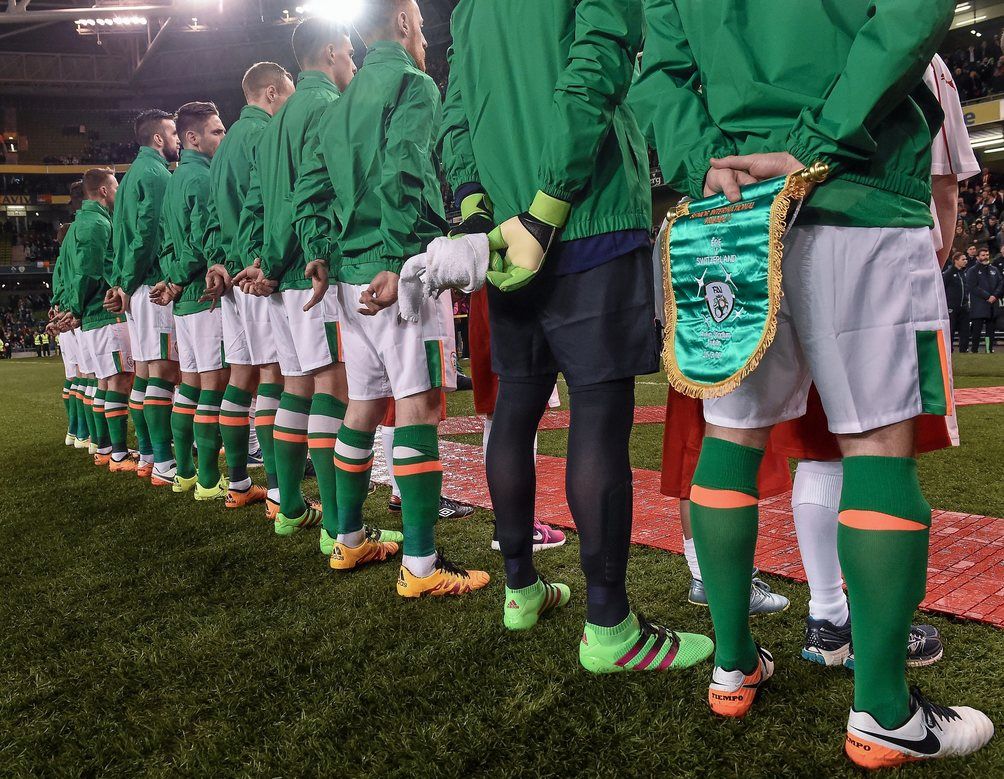The 2016 year in sponsorship kicked off with a bang. “I’m not angry with #Ladyball, I’m just disappointed”, said Newstalk’s Oisin Langan referring to one of the most divisive Irish sponsorships in recent years. Following on from their brand activations in other regions, Lidl finally took their first step into Irish sponsorship in 2016 and it came with a tidal wave of controversy.
A teaser video described the launch of a new Ladyball, especially for female use due to its soft touch and it’s pink aesthetic. The twitter account played along, serving to enrage and entertain Ireland’s online audience. Even to the uninitiated it was clear there was more to Ladyball, but it would have to be good, really good, to appease those who were baying for their marketeers blood.
The 2016 year in sponsorship kicked off with a bang. “I’m not angry with #Ladyball, I’m just disappointed”, said Newstalk’s Oisin Langan referring to one of the most divisive Irish sponsorships in recent years. Following on from their brand activations in other regions, Lidl finally took their first step into Irish sponsorship in 2016 and it came with a tidal wave of controversy.
A teaser video described the launch of a new Ladyball, especially for female use due to its soft touch and it’s pink aesthetic. The twitter account played along, serving to enrage and entertain Ireland’s online audience. Even to the uninitiated it was clear there was more to Ladyball, but it would have to be good, really good, to appease those who were baying for their marketeers blood.
When the reveal came it was in the form of a €1.5million investment by Lidl into the Ladies Gaelic Football Association and would backed by a substantial online, TV, outdoor and print advertising campaign to boost the profile of the sport across the country.
An impressive commitment to ladies football with the tagline #SeriousSupport, although even after the reveal many still questioned using such negative tactics for a package of support so big it should have been well able to stand on its own, without the controversial teaser.
Whatever about the strategy used, Lidl had raised the bar for sponsorship for 2016 and it was only a matter of time before their close rivals Aldi took the plunge into Irish sport. Their target was rugby. A four-year commitment by the German retailer focused on getting school children playing rugby was the hook and an ad campaign fronted by Paul O’Connell got their relationship off to an impactful start.
It wasn’t the only significant sponsorship announcement around Irish Rugby in 2016. Three Ireland had declared they would cease their sponsorship with the IRFU after the Six Nations and all eyes were on what logo would adorn the Irish jerseys on the summer tour in South Africa.
Before a new sponsor was officially revealed, Three had the opportunity to leave their IRFU partnership with some style and they accomplished this by helping to tackle something much bigger than rugby.
The mobile phone company teamed up with Focus Ireland to #TackleHomelessness, producing an impactful three minute promo video based loosely on “Ireland’s Call” calling on fans to stand Shoulder-To-Shoulder to tackle the crisis. Three also gave up their advertising slots across all media to support the campaign that was awarded the Sponsorship of the Year at the Irish Sponsorship Awards in November.
When the reveal came it was in the form of a €1.5million investment by Lidl into the Ladies Gaelic Football Association and would backed by a substantial online, TV, outdoor and print advertising campaign to boost the profile of the sport across the country.
An impressive commitment to ladies football with the tagline #SeriousSupport, although even after the reveal many still questioned using such negative tactics for a package of support so big it should have been well able to stand on its own, without the controversial teaser.
Whatever about the strategy used, Lidl had raised the bar for sponsorship for 2016 and it was only a matter of time before their close rivals Aldi took the plunge into Irish sport. Their target was rugby. A four-year commitment by the German retailer focused on getting school children playing rugby was the hook and an ad campaign fronted by Paul O’Connell got their relationship off to an impactful start.
It wasn’t the only significant sponsorship announcement around Irish Rugby in 2016. Three Ireland had declared they would cease their sponsorship with the IRFU after the Six Nations and all eyes were on what logo would adorn the Irish jerseys on the summer tour in South Africa.
Before a new sponsor was officially revealed, Three had the opportunity to leave their IRFU partnership with some style and they accomplished this by helping to tackle something much bigger than rugby.
The mobile phone company teamed up with Focus Ireland to #TackleHomelessness, producing an impactful three minute promo video based loosely on “Ireland’s Call” calling on fans to stand Shoulder-To-Shoulder to tackle the crisis. Three also gave up their advertising slots across all media to support the campaign that was awarded the Sponsorship of the Year at the Irish Sponsorship Awards in November.
In May it was announced Vodafone would make the move back into Irish sport as part of a €15million 4-year-deal. Vodafone had cut their relationship with Irish sport when they ended their sponsorship of Dublin GAA in 2013 as the brand moved their sponsorship towards more popular culture such as comedy and music festivals. However 3 years later and Vodafone could not resist the lure of widespread appeal and exposure opportunities that Irish rugby provides.
While Vodafone’s rivals Three are retaining their relationship with the Football Association of Ireland, they are simultaneously moving into the music sphere. Their inheritance of the Point Depot naming rights following the O2 takeover has seen Three’s sponsorship strategy moving towards music events and festivals. This is exactly where Vodafone were moving to three years ago, highlighting the cyclical nature of sponsorship as brands try everything to target the younger demographics.
The summer of 2016 saw a multitude of brands competing across some of the biggest events in world sport, not to mention the GAA Championships. Euro 2016 and the Rio Olympics & Paralympics provided brands with the opportunity to engage Irish consumers through innovative activation with plenty of big names jumping on the Green Army bandwagon for the Summer.
The Greatest Show on Earth took place in Rio in 2016 and following on from the huge success of London 2012, they had a hard act to follow. Unfortunately the Games were overshadowed by a range of controversies both Irish and International, while disappointing results and a difficult time difference made it hard for Irish audiences to connect with the event in the same way they had four years previously.
Despite this some brands provided some excellent innovation in the run up to the games with Electric Ireland’s sponsorship of the Irish Olympic team again to the fore. Their 360 Degree training video with Michael Conlon in the run into the games was one of the main highlights.
The Euro 2016 Championships was a huge success for Ireland on a number of levels. Success on the pitch thanks to the likes of Robbie Brady and Seamus Colemen, while success off the pitch saw the Irish fans capture the hearts of people across the world with their lullabies and ability to serenade even the sternest of French police officers.
From a brand perspective, a strong advertising campaign from team sponsor Three around fan support was prominent throughout the tournament while Carlsberg were again busy activating at an Irish level ahead of the event. Spar’s Team of “Gary Breens” campaign was probably one of the most unique activations in the lead in to the Euros and managed to drive footfall to Spar shops for those who always wanted a facemask of Ireland’s 2002 World Cup cult hero.
The GAA Championships saw the annual battle in football and hurling across the Association’s tiered sponsorship. With three sponsors in each code, standing out from the crowd can be a huge challenge for brands. In 2016 the football championship saw Supervalu, Eir and AIB all competing for the hearts of football fans across the country.
This was AIB’s first foray into the inter-county game having excelled in their sponsorship of the club championships in recent years, particularly under with #TheToughest campaign. Their transition was seamless which made them the stand out brand in the football championship as they successfully merged both sponsorships with some innovative activations highlighting the key elements club teams play in preparing players to excel for their counties.
AIB managed to catch the eye of many with their Toughest Trade activation, which saw Aidan O’Shea swap Gaelic Football for American Football, while Brendan Maher traded the ash of a hurl for the willow of the cricket bat. The activation was supplemented with documentary coverage on TV3 and RTE and helped to further embed the AIB brand in the minds of GAA fans across the country.
While AIB made a big splash, Supervalu aligned their sponsorship to their healthy eating campaign whilst also directing communications around the sponsorship towards clubs at a grassroots level. Eir, who had invested so heavily in their re-brand and takeover of Setanta, were the quietest of the three sponsors so no doubt they will be planning some eye catching activations for 2017.
The Hurling Championship was the more unloved when it came to sponsors activation in 2016. Centra followed the path of their sister company Supervalu and activated through their “Live Well” healthy eating campaign, however the remaining sponsors Etihad and Liberty Insurance failed to properly push their sponsorships last year.
Not surprising from Etihad’s perspective as they have traditionally under activated one of Ireland’s hottest sponsorship properties but Liberty had made a huge push the previous year, particularly linking the hurling and camogie championships around their Women in Sport initiative. It became clear why they had been so quiet towards the end of the year as Liberty confirmed they would not be continuing the sponsorship in 2017.
This opened the door for a new face in the Hurling Championship, and online retailer, Littlewoods Ireland, took its place with a glitzy launch at Croke Park featuring Anna Geary, Austin Gleeson and Jackie Tyrrell. It was clear from the launch that Littlewoods Ireland had allocated a substantial budget to the announcement with a wealth of paid for content appearing online on launch day. If Littlewoods can allocate that level of budget to guarantee launch publicity it will be intriguing to see what they have lined up for the 2017 Championship.
Some of the other big name sponsors were continuing to make their mark in 2016. Guinness remain activating in sport as their Pro12 sponsorship keeps their foot in the door with rugby, while they continue to use clever activations around the GAA without the cost of a direct sponsorship.
Aviva’s Lansdowne Road sponsorship continues to pay off for the insurer with great success internationally for the rugby and soccer sides in 2016. However Aviva’s overall focus on grassroots sport continued in 2016 with their FAI Junior Cup sponsorship again a winner at the Irish Sponsorship Awards for the third time in four years.
This looks set to continue into 2017 as they announced their sponsorship of the FAI’s Soccer Sisters programme in November to supplement their already burgeoning portfolio of grassroots partnerships.
2017 promises to be another exciting year in the world of Irish sports sponsorship with VR, social and customer / fan facing activations to be prominent.
Declan Lee is a Client Director for Insight Consultants. He is a multi award winning PR consultant who has handled sponsorships on behalf of some of the biggest international brands including AVIVA, Powerade, Three, William Hill, the FIA and Coca Cola.





 RSS Feed
RSS Feed


